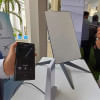Can Starlink finally unlock remote work for Bangladesh?

For years now, the idea of working from a remote beach house in Cox's Bazar, or a homestead in Bandarban has lived in the heads of urban office workers rent-free. The fantasy's always been there. A life unshackled from the gridlock of the cities, where one could earn, create, collaborate and maybe even run a business — all from the comfort of home, or better yet, a place that actually feels like home. The only catch? The so-called Countrywide connectivity never really delivered countrywide.
Elon Musk's low-orbit satellite internet service Starlink just landed in Bangladesh with a big promise: stable, high-speed internet anywhere in the country. As of May 2025, the service is available nationwide with two subscription tiers — starting from Tk 4,200 a month. There's a one-time hardware cost of Tk 47,000, which isn't exactly pocket change, but still cheaper than relocating for a job you never liked to begin with.
Bangladesh's internet infrastructure has long been a mixed bag. While urban centres like Dhaka and Chattogram enjoy relatively reliable connections (on good days, that is), most rural and semi-urban areas lag behind. Forget Zoom meetings — sometimes even sending an email feels like asking too much. That's where Starlink might flip the script. It's hardware doesn't rely on towers or fibre-optic cables. You set it up yourself, point it at the sky, and voilà! You're connected. Whether you're in Bandarban or Bagerhat.
This, in essence, could be the digital equaliser we've been waiting for. Imagine what this could mean structurally. Offices don't have to be concentrated in city centres anymore. Companies can hire talent from any district without worrying about connectivity. A tech startup could be built from Panchagarh. An international client call could be taken from a rice field-adjacent homestead in Gopalganj. Sounds dramatic, but it's not impossible anymore.
Remote work, once considered a COVID-era blip, is slowly becoming embedded in global work culture. Big players like Shopify, GitLab, and Zapier have gone fully remote. Countries like Portugal and Estonia offer digital nomad visas. Even in Bangladesh, the freelance economy has seen steady growth. But inconsistent internet access outside major cities has always been the bottleneck.
Starlink might just be the missing piece. It's also worth noting that this shift could ease pressure on urban infrastructure. Let's not forget: our capital cities are overburdened, and every additional resident brings a demand for housing, transport, and utilities. If people no longer have to move to the city to access decent jobs, some of that pressure gets redistributed. Slowly, yes. But it's a start.
Now, some might argue the cost is still a barrier. And fair enough — a Tk 47,000 setup fee isn't for everyone. But consider the long-term trade-off: no daily commute, lower living costs outside the capital, and the possibility to live closer to family or in a more mentally peaceful space. For many, especially freelancers or business owners, that initial investment might start making a lot of sense.
Another interesting footnote — Starlink's setup doesn't just benefit the work-from-home crowd. It opens up potential for telemedicine in villages, digital education in char areas, and decentralised governance. A union parishad in Lalmonirhat could hold virtual consultations with ministries in Dhaka without needing a fragile mobile hotspot.
Infrastructure is just one piece of the puzzle, of course. Companies must adopt a new mentality, provide flexibility, and — perhaps most importantly — have faith in their workers if they want remote work to become a real phenomenon. But with Starlink removing the biggest technical excuse, the conversation may finally shift from "Can we?" to "Why aren't we?"
We've flirted with the idea of decentralised work for long enough. Maybe, just maybe, with a satellite dish pointed at the stars, we can bring that daydream a little closer to reality.

 For all latest news, follow The Daily Star's Google News channel.
For all latest news, follow The Daily Star's Google News channel. 








Comments